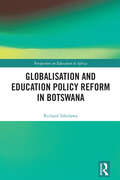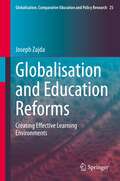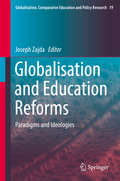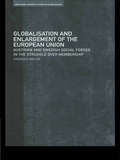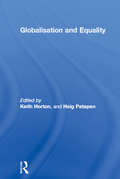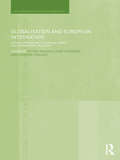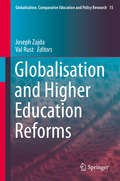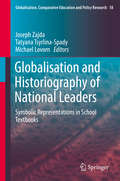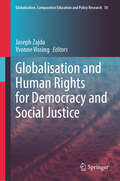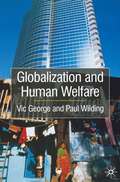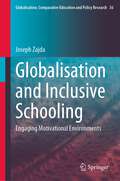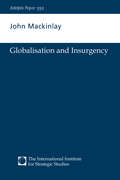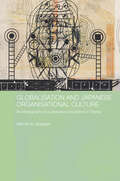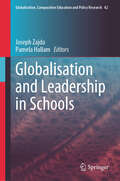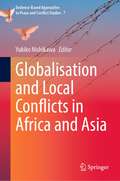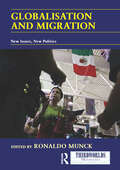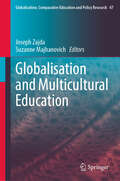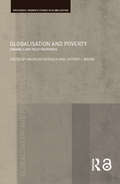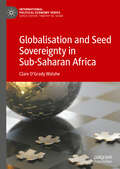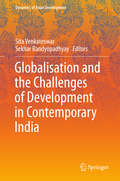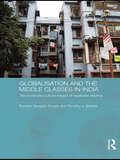- Table View
- List View
Globalisation and Education Policy Reform in Botswana (Perspectives on Education in Africa)
by Richard TabulawaThis book uses the global–local dialect approach to explicate education policy reform in Botswana and interrogates the practical effects of the various education policies on curriculum, pedagogy and governance of the Botswana General Education system. Considering the effect of three reform policies since Botswana’s Independence in 1966, the book evaluates the performance of each of the policies and examines their consequences in terms of the interplay of global forces and domestic pressures. The result of this interplay has been an education landscape that, while reflecting globally circulating education discourses, markedly differs from those same discourses. The book argues that the State in Botswana has appropriated education policy to legitimate itself in times of crisis and that each policy has improved access to general education but, collectively, have failed to improve its quality, making suggestions for how this can be improved in the future. As the first book of its kind to delve into education in Botswana from a single-authored critical lens, the book will be a highly relevant reading for academics, researchers and post-graduate students of African education, comparative education, education policy and curriculum studies.
Globalisation and Education Reforms: Creating Effective Learning Environments (Globalisation, Comparative Education and Policy Research #25)
by Joseph ZajdaThis book analyses discourses of effective learning environments globally. It focuses on the student’s cultural identity and academic achievement, the significance of cultural and social capital to student’s academic achievement, motivational strategies enhancing engagement and performance, effective teaching strategies, and quality in education for all. The book discusses and evaluates the shifts in methodological approaches to effective learning environments and globalisation. It analyses such topics as the students’ cultural identity and achievement, motivational strategies for creating effective learning environment, constructivist pedagogy for critical thinking, dimensions of discrimination in schools globally, intelligence testing and the effects on academic achievement, and values education in the classroom. The book evaluates the shifts in methodological approaches to globalisation and effective learning environments globally, and their impact on education policy and pedagogy. It contributes in a very scholarly way, to a more holistic understanding of the nexus between globalisation, comparative education research and effective learning environments education reforms.
Globalisation and Education Reforms: Paradigms And Ideologies (Globalisation, Comparative Education And Policy Research Ser. #19)
by Joseph ZajdaThis book explores the interrelationship between ideology, the state, and education reforms, placing it in a global context. It examines some of the major education reforms and policy issues in a global culture, particularly in light of recent shifts in quality and standards-driven education, and policy research. The book critiques the neo-liberal ideological imperatives of current education and policy reforms, and illustrates the way the shifts in the relationship between the state and education policy affect current trends in education reforms and schooling globally. With this as its focus, the book’s individual chapters highlight hand-picked scholarly research on major discourses in the field of comparative education. A compendium of the very latest thinking on the subject, the book – like the other volumes in the series – offers a state-of-the-art sourcebook for researchers, practitioners and policymakers alike. Not only do the chapters offer a timely overview of current issues affecting comparative education and education policy research in what is now a global educational culture; they also outline future directions that education and policy reforms could take. By doing so, they provide a comprehensive picture of the intersecting and diverse discourses of globalisation and policy-driven reforms in education. Individual chapters critically assess the dominant discourses and debates on education and policy reforms. Using diverse comparative education paradigms from critical theory to historical-comparative research, they address globalisation, ideology and democracy and examine both the reasons for and outcomes of education reforms and policy change. As such, they provide an informed critique of models of quality and standards-driven education reforms that are informed by Western dominant ideologies and social values.
Globalisation and Enlargement of the European Union: Austrian and Swedish Social Forces in the Struggle over Membership (Routledge Studies in Globalisation)
by Andreas BielerOn January 1 1995, Austria and Sweden joined the European Union (EU). This book examines why these two countries joined at such a moment and studies their accession against the structural background of globalization. In this cutting-edge analysis, Andreas Bieler argues that conventional neo-functionalist and intergovernmentalist theories fail to explain such structural change as they take existing power structures as given. Therefore, he develops a neo-Gramscian perspective as an alternative approach to European integration.
Globalisation and Equality (Challenges of Globalisation #Vol. 1)
by Keith Horton Haig PatapanIs globalisation creating a more unequal world? Is it creating new forms of inequality? Does it make certain pre-existing forms of inequality more morally or politically significant than they would otherwise have been?Globalisation and Equality examines these and related questions, exploring the way increasing globalisation is challenging our conceptions of equality. The contributors explore these themes from both theoretical and empirical perspectives. Some adopt a more abstract approach, exploring foundational questions concerning the meaning of equality, its social and political dimensions, and more specifically its moral implications in a global context. Others engage the general themes of globalisation and equality by focusing on specific topics, such as welfare, citizenship, gender, culture, and the environment.Original in the questions it poses, and interdisciplinary in its approach, this collection of essays will appeal to all those with an interest in globalisation and equality.
Globalisation and European Integration: Critical Approaches to Regional Order and International Relations (Routledge Studies in Globalisation)
by Amy Verdun Henk Overbeek Petros Nousios Andreas TsolakisThis book explores the links between European integration and globalisation, and examines the potential for social transformation in the context of the global economic crisis and the resulting EU reforms. Divided into three parts, this book offers both empirical and theoretical analyses of social integration, supranationality and global competition. Drawing on Critical Political Economy research, Neo-Gramscian, Open Marxist, Regulationist and Post-structuralist scholars subject a wide range of European flagship policies in matters of competition, trade and security to critical scrutiny and relate them to global political economy dynamics. Contributors examine the ways in which current global economic turbulence has affected the European Union, its membership and its adjacent areas, and determine the potential for economic and political transformation in light of the global economic crisis and Europe’s 2020 Strategy. In the emerging multi-polar world, in which the EU and the US are expected to share global policymaking with new powers, this book argues for a revised conceptualisation of European integration and its relationship with globalisation. Globalisation and European Integration will be of interest to students, scholars and researchers of globalisation, political economy, international relations, and European Union politics.
Globalisation and Higher Education Reforms
by Joseph Zajda Val RustThis volume explores the interrelationship between ideology, the state and higher education reforms, setting it in a global context. It examines some of the major higher education reforms and policy issues in a global culture, particularly in the light of recent shifts in quality and standards-driven education and policy research. In doing so, the book provides a comprehensive picture of the intersecting and diverse discourses of globalisation and policy-driven reforms in higher education. Representing scholarly research on major discourses in the field of higher education reforms, the book draws upon recent studies in the areas of globalisation, equality, and the role of the state in higher education reforms. It critiques the neo-liberal ideological imperatives of current higher education and policy reforms, and illustrates the way that shifts in the relationship between the state and higher education policy affect current trends in higher education reforms. Individual chapters critically assess the dominant discourses and debates on higher education and policy reforms. Using diverse comparative education paradigms from critical theory to historical-comparative research, the chapters focus on globalisation, ideology and higher education reforms and examine both the reasons and outcomes of higher education reforms and policy change. "Anyone who has been involved in higher education over the past few decades cannot fail to be affected by the impact of globalisation and neo-liberal policies on universities and society at large. In 'Globalisation and Higher Education Reforms', the 15th volume of the series 'Globalisation, Comparative Education and Policy Research', Joseph Zajda and Val Rust present chapters on education reform in the USA and in international contexts that highlight the inroads that neo-liberalism has made into policy making at higher education institutions. The chapters also illustrate the way universities have been reinventing themselves to meet the demands of a knowledge society in which corporate values of efficiency, performance and managerialism drive the agenda. What are the effects of internationalisation on higher education in the universities of today? With chapters from internationally respected scholars from around the globe, this book seeks to address the many issues of the new reality in higher education. This is a welcome, accessible volume for all those concerned with research, policy-making and curriculum development. " Professor Suzanne Majhanovich, Western University
Globalisation and Historiography of National Leaders
by Joseph Zajda Tatyana Tsyrlina-Spady Michael LovornGlobalisation and Historiography of National Leaders: Symbolic Representations in School Textbooks, the 18th book in the 24-volume book series Globalisation, Comparative Education and Policy Research, explores the interrelationship between ideology, national identity, national history and historical heroes, setting it in a global context. Based on this focus, the chapters represent hand-picked scholarly research on major discourses in the field of history textbooks and symbolic representations of national heroes, and draw upon recent studies in the areas of globalisation, history textbooks, and national leaders. A number of researchers have written on the importance of teaching national history in order to foster national identity and a sense of belonging to a certain society, state, and people among the younger generation. Some nations prefer to create national heroes out of their political leaders who are still in power, and whose lives and reputation are portrayed as being eminently spotless. Using diverse comparative education paradigms from critical theory, social semiotics, and historical-comparative research, the authors analyse the unpacking of the ideological agenda hidden behind the choice and lionization (or silencing) of the preferred national heroes. They provide an informed critique of various historical narratives depicting national leaders and national heroes. The book provides an easily accessible, practical yet scholarly source of information on international concerns in the field of globalisation, history education and policy research. Offering an essential sourcebook of ideas for researchers, history educators, practitioners and policymakers in the fields of globalisation and history education, it also provides a timely overview of current changes in politically correct history education narratives in history textbooks.
Globalisation and Human Rights for Democracy and Social Justice (Globalisation, Comparative Education and Policy Research #50)
by Joseph Zajda Yvonne VissingThis book analyses major discourses of human rights for democracy and social justice. The chapters contained in the book examine critically major issues confronting human rights for democracy and social justice both locally and globally. The chapters analyze the challenges that different societies are confronted with, as they attempt to implement, protect and defend democracy, cultural diversity and human rights in an ever-changing world, and culturally diverse environment. Topics covered include dimensional concerns for social justice and human rights and what to do about them, human rights for democracy and social justice, and celebrating cultural diversity in sport. The book will help readers to explore their own views and consider more broadly what may be in the best interests of a fair and just society, as envisioned in human rights treaties, human rights education in schools, and cultural diversity.
Globalisation and Human Welfare
by Vic George Paul WildingThis thematically structured text offers an ideal introduction to the positive and negative effects of globalization on human welfare in industrial and developing societies. It documents the effects of globalization on economic growth, income distribution, poverty, education, health, social care and the environment. It pays special attention to the effects of globalization on ethnic and gender issues and concludes with an assessment of the possibilities of global social policy. It will appeal to undergraduates in the social sciences both as a basic text and a reference book.
Globalisation and Inclusive Schooling: Engaging Motivational Environments (Globalisation, Comparative Education and Policy Research #36)
by Joseph ZajdaThis book analyses discourses of inclusive schooling and engaging motivational environments globally. It focuses on the student’s identity, belonging, performance in the classroom, and the significance of cognitive, cultural, emotional and social capital to student’s academic achievement. The book discusses and evaluates the shifts in methodological approaches to inclusive and engaging learning environments. It analyses topics such as the students’ cultural identity and achievement, motivational strategies for creating engaging learning environment, the use of constructivist pedagogy for critical thinking, social constructivism, and values education in the classroom. The book also analyses and evaluates the shifts in methodological approaches to globalisation and inclusive schooling globally, and their impact on performing schools. It contributes in a very scholarly way, to a more holistic understanding of the nexus among globalisation, comparative education research, inclusive schooling and engaging learning environments.
Globalisation and Insecurity in the Twenty-First Century: NATO and the Management of Risk (Adelphi series #345)
by Christopher CokerDiscusses the impact of globalisation on security in the West and in particular the way it has changed the nature of NATO as well as its security agenda.
Globalisation and Insurgency (Adelphi series)
by John MackinlayThe central proposition of this book is that global changes have altered the nature of insurgency by weakening some governments and empowering the forces that seek to overthrow them. The book identifies four distinct categories of insurgent force, and concludes that globalisation of insurgency leads inexorably to the globalisation of counter-insurgency.
Globalisation and Japanese Organisational Culture: An Ethnography of a Japanese Corporation in France
by Mitchell SedgwickGlobalisation � the global movement, and control, of products, capital, technologies, persons and images � increasingly takes place through the work of organisations, perhaps the most powerful of which are multinational corporations. Based in an ethnographic analysis of cross-cultural social interactions in everyday workplace practices at a subsidi
Globalisation and Leadership in Schools (Globalisation, Comparative Education and Policy Research #42)
by Joseph Zajda Pamela HallamThis book analyses dominant discourses of globalisation and leadership in schools. The chapters in this volume advance further the discussions of the nexus between globalisation and leadership in schools. The politics of education reforms, governance and school leadership in the 21st century reflect a new emerging paradigm of standards-driven and outcomes-defined educational policy change. This ethos of academic performance has affected the nature and the role of school leadership in the 21st century, and emerging educational challenges and strategies. Academic achievement, standards, and educational results overall, depend on the nature and quality of school leadership, teachers and school’s culture. Another emerging change affecting school leadership is autonomy in schools in designing curricula and managing resources, where the role of the school leader has grown far beyond that of administrator. School autonomy has also affected the changing role of school leadership. The other key role of effective leadership is the focus on diagnosing the school’s needs, and supporting, evaluating and developing teacher quality. Developing school leaders in the 21st century requires clearly defining their key leadership roles and responsibilities for leading and inspiring teachers to achieve high academic standards, and the quality of the curriculum, and acknowledging, and accepting their significant role in improving school‘s image, as a standards-driven and academically performing institution.The book contributes in a very scholarly way, to a more holistic understanding of the nexus between globalisation, and dominant discourses of leadership in schools.
Globalisation and Local Conflicts in Africa and Asia (Evidence-Based Approaches to Peace and Conflict Studies #7)
by Yukiko NishikawaThis edited book is written by six authors from Asia and Africa. The individual authors focus on their own country's case or cases that they have been working on. The book features local conflicts in six countries in Asia and Africa and identifies how the local conflicts are affected by the forces of globalization. Cases include Nigeria's oil-related conflicts, the Democratic Republic of Congo's timber conflicts, continuing instability in Mozanbique, Thailand's conflict with regard to AIDS medicine, Myanmar's local conflicts after its reforms, and the Afghanistan’s conflicts over minerals. From these diverse case studies, the book examines how globalization and international politics affect local politics and conflicts, and vice versa. Even seemingly internal conflicts are shown to be significantly influenced by globalization forces and to create new dynamism in local politics. While there are other books that explore globalization and conflicts, many of them are conceptually organized with a small number of case studies. The present volume examines local conflicts in relation to globalization and demonstrates how structural inequality vis-a-vis weak stateness and statehood are significantly affected by global political economy.
Globalisation and Migration: New Issues, New Politics (Thirdworlds Ser.)
by Ronaldo MunckThis book critically examines the new issues and new politics regarding migration in the era of globalisation from a majority world perspective. It examines the current shifts in the global political economy and the effects it has, for example, in relation to rural displacement. When and how does this lead to national and/or transnational migration? We need to examine the ways in which migration is cut across and impacts on the generation of racism and xenophobia in the west. The issue of remittances by migrants to the ‘developing’ nations needs careful study as does the controversial issue of ‘brain drain’ versus ‘brain gain’ through migration. The growing importance of trafficking for forced labour has now been taken up by various international bodies but is it the new normality or simply an unfortunate side effect of globalisation to be overcome through legislation? Migration is becoming increasingly gendered in its composition and flows but also in the receiving countries where men and women do very different jobs. We can predict the increasing racialization and gendering of migration but how will the state and society respond to these shifts? This book was published as a special issue of Third World Quarterly.
Globalisation and Multicultural Education (Globalisation, Comparative Education and Policy Research #47)
by Joseph Zajda Suzanne MajhanovichThis book analyses dominant discourses of globalisation, multiculturalism and schooling. The chapters advance further the discussions on globalisation and its impact on cultural diversity and multiculturalism in a globalised world. Multicultural education, as presented in this volume, is seen in a broad context. It includes factors such as race, ethnicity, gender, socio-economic status, culture, age, and physical ability, as well as a variety of beliefs and values. Zajda has argued that globalisation represents a synthesis of technology, ideology, and organisation, specifically related to border crossings of people, global finance, trade, IT convergence, as well as cross-cultural communication. The reality of multiculturalism has been brought into stronger focus because of globalisation. Multiculturalism is more evident today because of globalisation. The book contributes in a very scholarly way, to a more holistic understanding of the nexus between globalisation and dominant models of multicultural education, and their impact on students’ engagement, and academic achievement.
Globalisation and Poverty: Channels and Policy Responses (Routledge Studies in Globalisation)
by Maurizio Bussolo Jeffery I. RoundThe consequences of globalization for the world's poor are uncertain and fierce rhetoric is dividing its supporters and detractors. The channels of effect of essentially macroeconomic shocks on the microeconomic position of individuals and households in poor countries are many and various. This book addresses three core issues: 1) what are the main channels of effect? 2) what are the lessons to be learned from policy measures to alleviate negative poverty consequences? and 3) do the proposed analytical approaches assist in providing a monitoring capability? This volume assesses the more easily quantifiable effects resulting from price and quantity responses in the goods and labour markets. It includes studies of Colombia, Ghana, India, Nepal, Bangladesh and Vietnam. It uses key analytical approaches, most of which are based on numerical simulation methods employing models with different levels of complexity. These models capture the features of an economy, how it functions, and how it might respond to globalization shocks. The most important collective contribution of the authors is their establishment of directions and magnitudes of effect, based on empirical evidence.
Globalisation and Seed Sovereignty in Sub-Saharan Africa (International Political Economy Series)
by Clare O'Grady Walshe"It is my expectation that respect for the critical importance of seed sovereignty will in due course be recognised by member states of the United Nations to be as critical to global peace and security as the UN Charter demands in respect of State sovereign equality, justice, human rights and economic and social wellbeing for all peoples."—Denis J. Halliday, UN Assistant Secretary-General 1994-98 "A constructive contribution to our understanding of what is going wrong and what can go right in the complex area of seed sovereignty."—Dervla Murphy, renowned travel writer and adventurer"Keeping seed diversity alive is the secret ingredient, not just for the good, nutrient-dense food that every cook, gardener and farmer/producer needs, but for strengthening our resilience in the face of multiple environmental threats. This compelling and timely book helps us to understand what we are up against and how we can overcome it."— Darina Allen, internationally renowned cook, founder of Ballymaloe Cookery school and President of the East Cork Convivium of Slow FoodThis book studies the relationship between globalisation and seed sovereignty in Sub-Saharan Africa. It provides comparative case studies of the most recent Kenyan and Ethiopian seed laws, as well as a study of seed sovereignty 'on the ground' in a locality within Ethiopia. Based on extensive fieldwork, it identifies the interests and motivations of transnational seed corporations, global philanthropic organisations, state actors, and local farmers. It finds significant differences in the wording of seed laws and the exercise of seed sovereignty, applying theories of globalisation to help us better understand these varied outcomes. It shows that seed sovereignty has the potential to be shared between local, national, regional, and global authorities, but in different ways in different countries and localities. In the face of what might sometimes appear to be unstoppable global forces, these findings suggest that the exercise of seed sovereignty can be transformed even in a highly globalised world.
Globalisation and the Challenges of Development in Contemporary India
by Sita Venkateswar Sekhar BandyopadhyayThis volume brings together multidisciplinary, situated and nuanced analyses of contingent issues framing a rapidly changing India in the 21st century. It moves beyond the ready dichotomies that are often extended to understand India as a series of contrasts and offers new insights into the complex realities of India today, thereby enabling us to anticipate the decades to come. The editors focus on three major themes, each discussed in a section: The first section, Framing the Macro-Economic Environment, defines the framework for interrogatingglobalisation and socio-economic changes in India over the last few decades ofthe 20th century spiraling into India in the 21st century. The next section,Food Security and Natural Resources, highlights critical considerationsinvolved in feeding a burgeoning population. The discussions pose importantquestions in relation to the resilience of both people and planet confrontingincreasingly unpredictable climate-induced scenarios. The final section,Development, Activism and Changing Technologies, discusses some of the socialchallenges of contemporary India through the lens of inequalities and emergentactivisms. The section concludes with an elaboration of the potential and promise of changing technologies and new social media to build an informed and active citizenry across existing social divides.
Globalisation and the Future of Terrorism: Patterns and Predictions (Contemporary Security Studies)
by Brynjar LiaThis new study is devoted to understanding how international terrorism is shaped, how it evolves and what we can expect in the future. Drawing upon research and methods outside the traditional focus, and by taking both a theoretical approach and a new practical predictive perspective, it delivers a fresh and fascinating contribution to terrorism studies. While predicting terrorism is a highly speculative business, there are ways of identifying certain long-term causes, driving forces and their links with society. Terrorists are usually integral players in local and sometimes global politics. Hence, when the local, regional and international contexts change, so does terrorism. Thoroughly reviewing the body of literature on the causes of terrorism, this study also combines predictive and futuristic analyses on globalisation, supported by a range of key case studies. It spans from the transformation of international relations, the globalisation of the market economy, demographic factors, ideological shifts and technological changes. The result is a set of key conclusions about the future patterns of terrorism, which are not simply best guesses, but also backed up by solid research. This book will be of great interest to all students and scholars of terrorism, globalisation, politics and international relations.
Globalisation and the Middle Classes in India: The Social and Cultural Impact of Neoliberal Reforms (Routledge Contemporary South Asia Series)
by Ruchira Ganguly-Scrase Timothy J. ScraseThis book fills an important gap in the existing literature on economic liberalization and globalisation in India by providing much needed ethnographic data from those affected by neoliberal globalisation. Based on ethnographic fieldwork and interviews, it reveals the complexity of the globalisation process and describes and accounts for the contradictory attitudes of the lower middle classes. The authors challenge the notion of a homogeneous Indian middle class as being the undoubted beneficiaries of recent neoliberal economic reforms, showing that while the lower middle classes are generally supportive of the recent economic reforms, they remain doubtful about the long term benefits of the country's New Economic Policy and liberalisation. Significantly, this book discusses and analyzes both the economic and cultural sides to globalisation in India, providing much-needed data in relation to several dimensions including the changing costs of living; household expenditure, debt and consumerism; employment and workplace restructuring; gender relations and girls’ education; global media and satellite television; and the significance of English in a globalising India. Globalisation and the Middle Classes in India will be of interest to scholars and students working in the fields of Sociology, Social Anthropology and Development Studies, as well as Asian Studies - in particular studies of South Asia and India - and Globalisation Studies.
Globalisation and the Roman World
by Martin Pitts Miguel John VersluysThis book explores a new perspective for understanding the Roman world, using connectivity as a major point of departure. Globalisation is apparent in increased flows of objects, people and ideas and in the creation of translocal consciousness in everyday life. Based on these criteria, there is a case for globalisation in the ancient Roman world. Essential for anyone interested in Romanisation, this volume provides the first sustained critical exploration of globalisation theories in Roman archaeology and history. It is written by an international group of scholars who address a broad range of subjects, including Roman imperialism, economics, consumption, urbanism, migration, visual culture and heritage. The contributors explore the implications of understanding material culture in an interconnected Roman world, highlighting several novel directions for future research.
Globalisation and the Rule of Law (Challenges of Globalisation)
by Spencer ZifcakGlobalisation and the Rule of Law reassesses the idea of the 'rule of law' within the present complex and increasingly internationalized environment. There have been many books studying the phenomenon of globalization and its economic, social or cultural consequences. This book, however, is the first to relate globalization exclusively to law. It examines the impact of globalization upon the rule of law, a fundamental value within liberal democratic sovereign states. The book opens with three chapters discussing the theory of the rule of law and its necessary reconceptualization in a global environment. Then, in three sections considering global trade, security and human rights, it proposes new ways of thinking about global law and its application in new and existing institutions of global governance. Contributors include top-flight academics, politicians and judges, making this book significant and relevant in both jurisprudential theory and political practice.
